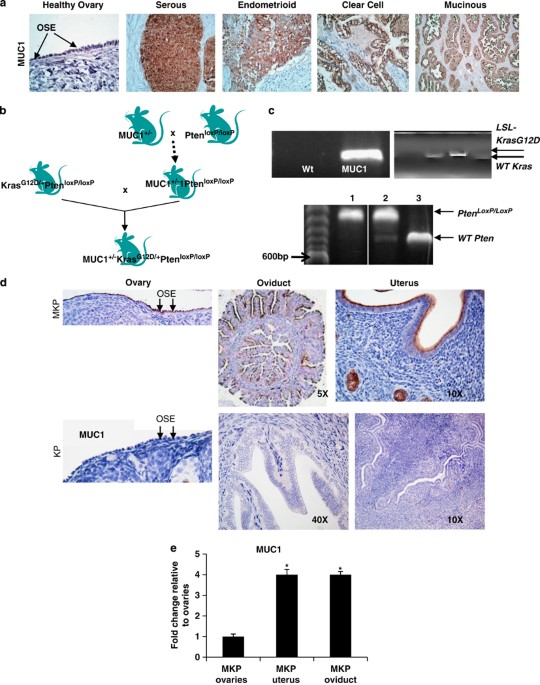
- Select a language for the TTS:
- UK English Female
- UK English Male
- US English Female
- US English Male
- Australian Female
- Australian Male
- Language selected: (auto detect) - EN
Play all audios:
ABSTRACT Epithelial ovarian cancer is an aggressive malignancy, with a low 5-year median survival. Continued improvement on the development of more effective therapies depends in part on the
availability of adequate preclinical models for _in vivo_ testing of treatment efficacy. Mucin 1 (MUC1) glycoprotein is a tumor-associated antigen overexpressed in ovarian cancer cells,
making it a potential target for immune therapy. To create a preclinical mouse model for MUC1-positive ovarian tumors, we generated triple transgenic (Tg) mice that heterozygously express
human MUC1+/− as a transgene, and carry the conditional K-rasG12D oncoallele (loxP-Stop-loxP-K-rasG12D/+) and the floxed _Pten_ gene (Pten/loxP/loxP). Injection of Cre recombinase-encoding
adenovirus (AdCre) in the ovarian bursa of triple (MUC1KrasPten) Tg mice triggers ovarian tumors that, in analogy to human ovarian cancer, express strongly elevated MUC1 levels. The tumors
metastasize loco-regionally and are accompanied by high serum MUC1, closely mimicking the human disease. Compared with the KrasPten mice with tumors, the MUC1KrasPten mice show increased
loco-regional metastasis and augmented accumulation of CD4+Foxp3+ immune-suppressive regulatory T cells. Vaccination of MUC1KrasPten mice with type 1 polarized dendritic cells (DC1) loaded
with a MUC1 peptide (DC1–MUC1) can circumvent tumor-mediated immune suppression in the host, activate multiple immune effector genes and effectively prolong survival. Our studies report the
first human MUC1-expressing, orthotopic ovarian tumor model, reveal novel MUC1 functions in ovarian cancer biology and demonstrate its suitability as a target for immune-based therapies.
Access through your institution Buy or subscribe This is a preview of subscription content, access via your institution ACCESS OPTIONS Access through your institution Subscribe to this
journal Receive 50 print issues and online access $259.00 per year only $5.18 per issue Learn more Buy this article * Purchase on SpringerLink * Instant access to full article PDF Buy now
Prices may be subject to local taxes which are calculated during checkout ADDITIONAL ACCESS OPTIONS: * Log in * Learn about institutional subscriptions * Read our FAQs * Contact customer
support SIMILAR CONTENT BEING VIEWED BY OTHERS TRANSCRIPTOME PROFILING AND CHARACTERIZATION OF PERITONEAL METASTASIS OVARIAN CANCER XENOGRAFTS IN HUMANIZED MICE Article Open access 24 May
2024 PERSONALIZED CANCER VACCINE STRATEGY ELICITS POLYFUNCTIONAL T CELLS AND DEMONSTRATES CLINICAL BENEFITS IN OVARIAN CANCER Article Open access 15 March 2021 PAX8 LINEAGE-DRIVEN T CELL
ENGAGING ANTIBODY FOR THE TREATMENT OF HIGH-GRADE SEROUS OVARIAN CANCER Article Open access 21 July 2021 REFERENCES * Shan W, Liu J . Epithelial ovarian cancer: focus on genetics and animal
models. _Cell Cycle_ 2009; 8: 731–735. Article CAS PubMed Google Scholar * Mullany LK, Fan HY, Liu Z, White LD, Marshall A, Gunaratne P _et al_. Molecular and functional characteristics
of ovarian surface epithelial cells transformed by KrasG12D and loss of Pten in a mouse model _in vivo_. _Oncogene_ 2011; 30: 3522–3536. Article CAS PubMed PubMed Central Google Scholar
* Flesken-Nikitin A, Choi KC, Eng JP, Shmidt EN, Nikitin AY . Induction of carcinogenesis by concurrent inactivation of p53 and Rb1 in the mouse ovarian surface epithelium. _Cancer Res_
2003; 63: 3459–3463. CAS PubMed Google Scholar * Boyd J . Mouse models of gynecologic pathology. _N Engl J Med_ 2005; 352: 2240–2242. Article CAS PubMed Google Scholar * Matzuk MM .
Gynecologic diseases get their genes. _Nat Med_ 2005; 11: 24–26. Article CAS PubMed Google Scholar * Connolly DC, Bao R, Nikitin AY, Stephens KC, Poole TW, Hua X _et al_. Female mice
chimeric for expression of the simian virus 40 TAg under control of the MISIIR promoter develop epithelial ovarian cancer. _Cancer Res_ 2003; 63: 1389–1397. CAS PubMed Google Scholar *
Yang DH, Fazili Z, Smith ER, Cai KQ, Klein-Szanto A, Cohen C _et al_. Disabled-2 heterozygous mice are predisposed to endometrial and ovarian tumorigenesis and exhibit sex-biased embryonic
lethality in a p53-null background. _The Am J Pathol_ 2006; 169: 258–267. Article CAS PubMed Google Scholar * Tanwar PS, Zhang L, Kaneko-Tarui T, Curley MD, Taketo MM, Rani P _et al_.
Mammalian target of rapamycin is a therapeutic target for murine ovarian endometrioid adenocarcinomas with dysregulated Wnt/beta-Catenin and PTEN. _PLoS One_ 2011; 6: e20715. Article CAS
PubMed PubMed Central Google Scholar * Dinulescu DM, Ince TA, Quade BJ, Shafer SA, Crowley D, Jacks T . Role of K-ras and Pten in the development of mouse models of endometriosis and
endometrioid ovarian cancer. _Nat Med_ 2005; 11: 63–70. Article CAS PubMed Google Scholar * Fan HY, Liu Z, Paquet M, Wang J, Lydon JP, DeMayo FJ _et al_. Cell type-specific targeted
mutations of Kras and Pten document proliferation arrest in granulosa cells versus oncogenic insult to ovarian surface epithelial cells. _Cancer Res_ 2009; 69: 6463–6472. Article CAS
PubMed PubMed Central Google Scholar * Gendler SJ, Lancaster CA, Taylor-Papadimitriou J, Duhig T, Peat N, Burchell J _et al_. Molecular cloning and expression of human tumor-associated
polymorphic epithelial mucin. _J Biol Chem_ 1990; 265: 15286–15293. CAS PubMed Google Scholar * Barnd DL, Lan MS, Metzgar RS, Finn OJ . Specific, major histocompatibility
complex-unrestricted recognition of tumor-associated mucins by human cytotoxic T cells. _Proc Natl Acad Sci USA_ 1989; 86: 7159–7163. Article CAS PubMed PubMed Central Google Scholar *
Ioannides CG, Fisk B, Jerome KR, Irimura T, Wharton JT, Finn OJ . Cytotoxic T cells from ovarian malignant tumors can recognize polymorphic epithelial mucin core peptides. _J Immunol_ 1993;
151: 3693–3703. CAS PubMed Google Scholar * Jerome KR, Domenech N, Finn OJ . Tumor-specific cytotoxic T cell clones from patients with breast and pancreatic adenocarcinoma recognize
EBV-immortalized B cells transfected with polymorphic epithelial mucin complementary DNA. _J Immunol_ 1993; 151: 1654–1662. CAS PubMed Google Scholar * Kotera Y, Fontenot JD, Pecher G,
Metzgar RS, Finn OJ . Humoral immunity against a tandem repeat epitope of human mucin MUC-1 in sera from breast, pancreatic, and colon cancer patients. _Cancer Res_ 1994; 54: 2856–2860. CAS
PubMed Google Scholar * Ahmad R, Raina D, Joshi MD, Kawano T, Ren J, Kharbanda S _et al_. MUC1-C oncoprotein functions as a direct activator of the nuclear factor-kappaB p65
transcription factor. _Cancer Res_ 2009; 69: 7013–7021. Article CAS PubMed PubMed Central Google Scholar * Ahmad R, Raina D, Trivedi V, Ren J, Rajabi H, Kharbanda S _et al_. MUC1
oncoprotein activates the IkappaB kinase beta complex and constitutive NF-kappaB signalling. _Nature Cell Biol_ 2007; 9: 1419–1427. Article CAS PubMed Google Scholar * Li Y, Bharti A,
Chen D, Gong J, Kufe D . Interaction of glycogen synthase kinase 3beta with the DF3/MUC1 carcinoma-associated antigen and beta-catenin. _Mol Cell Biol_ 1998; 18: 7216–7224. Article CAS
PubMed PubMed Central Google Scholar * Li Y, Kuwahara H, Ren J, Wen G, Kufe D . The c-Src tyrosine kinase regulates signaling of the human DF3/MUC1 carcinoma-associated antigen with GSK3
beta and beta-catenin. _J Biol Chem_ 2001; 276: 6061–6064. Article CAS PubMed Google Scholar * Wei X, Xu H, Kufe D . Human MUC1 oncoprotein regulates p53-responsive gene transcription in
the genotoxic stress response. _Cancer Cell_ 2005; 7: 167–178. Article CAS PubMed Google Scholar * Yamamoto M, Bharti A, Li Y, Kufe D . Interaction of the DF3/MUC1 breast
carcinoma-associated antigen and beta-catenin in cell adhesion. _J Biol Chem_ 1997; 272: 12492–12494. Article CAS PubMed Google Scholar * Besmer DM, Curry JM, Roy LD, Tinder TL, Sahraei
M, Schettini J _et al_. Pancreatic ductal adenocarcinoma mice lacking mucin 1 have a profound defect in tumor growth and metastasis. _Cancer Res_ 2011; 71: 4432–4442. Article CAS PubMed
PubMed Central Google Scholar * Rustin GJ, Bast RC, Kelloff GJ, Barrett JC, Carter SK, Nisen PD _et al_. Use of CA-125 in clinical trial evaluation of new therapeutic drugs for ovarian
cancer. _Clinical Cancer Res_ 2004; 10: 3919–3926. Article CAS Google Scholar * Karam AK, Karlan BY . Ovarian cancer: the duplicity of CA125 measurement. _Nat Rev Clin Oncol_ 2010; 7:
335–339. Article CAS PubMed Google Scholar * Reinartz S, Failer S, Schuell T, Wagner U . CA125 (MUC16) gene silencing suppresses growth properties of ovarian and breast cancer cells.
_European J Cancer_ 2011; 48: 1558–1569. Article Google Scholar * Theriault C, Pinard M, Comamala M, Migneault M, Beaudin J, Matte I _et al_. MUC16 (CA125) regulates epithelial ovarian
cancer cell growth, tumorigenesis and metastasis. _Gynecol Oncol_ 2011; 121: 434–443. Article CAS PubMed Google Scholar * Brayman M, Thathiah A, Carson DD . MUC1: a multifunctional cell
surface component of reproductive tissue epithelia. _Reprod Biol Endocrinol: RB&E_ 2004; 2: 4. Article Google Scholar * Feng H, Ghazizadeh M, Konishi H, Araki T . Expression of MUC1
and MUC2 mucin gene products in human ovarian carcinomas. _Jpn J Clin Oncol_ 2002; 32: 525–529. Article PubMed Google Scholar * Ho SB, Niehans GA, Lyftogt C, Yan PS, Cherwitz DL, Gum ET
_et al_. Heterogeneity of mucin gene expression in normal and neoplastic tissues. _Cancer Res_ 1993; 53: 641–651. CAS PubMed Google Scholar * Lau SK, Weiss LM, Chu PG . Differential
expression of MUC1, MUC2, and MUC5AC in carcinomas of various sites: an immunohistochemical study. _Am J Clin Pathol_ 2004; 122: 61–69. Article PubMed Google Scholar * Lu KH, Patterson
AP, Wang L, Marquez RT, Atkinson EN, Baggerly KA _et al_. Selection of potential markers for epithelial ovarian cancer with gene expression arrays and recursive descent partition analysis.
_Clin Cancer Res_ 2004; 10: 3291–3300. Article CAS PubMed Google Scholar * Van Elssen CH, Frings PW, Bot FJ, Van de Vijver KK, Huls MB, Meek B _et al_. Expression of aberrantly
glycosylated Mucin-1 in ovarian cancer. _Histopathology_ 2010; 57: 597–606. Article PubMed Google Scholar * Rowse GJ, Tempero RM, VanLith ML, Hollingsworth MA, Gendler SJ . Tolerance and
immunity to MUC1 in a human MUC1 transgenic murine model. _Cancer Res_ 1998; 58: 315–321. CAS PubMed Google Scholar * Budiu RA, Diaconu I, Chrissluis R, Dricu A, Edwards RP, Vlad AM . A
conditional mouse model for human MUC1-positive endometriosis shows the presence of anti-MUC1 antibodies and Foxp3+ regulatory T cells. _Dis Mod Mech_ 2009; 2: 593–603. Article CAS Google
Scholar * Budiu RA, Mantia-Smaldone G, Elishaev E, Chu T, Thaller J, McCabe K _et al_. Soluble MUC1 and serum MUC1-specific antibodies are potential prognostic biomarkers for
platinum-resistant ovarian cancer. _Cancer Immunol Immunother_ 2011; 60: 975–984. Article CAS PubMed Google Scholar * Roby KF, Taylor CC, Sweetwood JP, Cheng Y, Pace JL, Tawfik O _et
al_. Development of a syngeneic mouse model for events related to ovarian cancer. _Carcinogenesis_ 2000; 21: 585–591. Article CAS PubMed Google Scholar * Curiel TJ, Coukos G, Zou L,
Alvarez X, Cheng P, Mottram P _et al_. Specific recruitment of regulatory T cells in ovarian carcinoma fosters immune privilege and predicts reduced survival. _Nat Med_ 2004; 10: 942–949.
Article CAS PubMed Google Scholar * Kryczek I, Wei S, Zhu G, Myers L, Mottram P, Cheng P _et al_. Relationship between B7-H4, regulatory T cells, and patient outcome in human ovarian
carcinoma. _Cancer Res_ 2007; 67: 8900–8905. Article CAS PubMed Google Scholar * Sato E, Olson SH, Ahn J, Bundy B, Nishikawa H, Qian F _et al_. Intraepithelial CD8+ tumor-infiltrating
lymphocytes and a high CD8+/regulatory T cell ratio are associated with favorable prognosis in ovarian cancer. _Proc Natl Acad Sci USA_ 2005; 102: 18538–18543. Article CAS PubMed PubMed
Central Google Scholar * Ryan SO, Vlad AM, Islam K, Gariepy J, Finn OJ . Tumor-associated MUC1 glycopeptide epitopes are not subject to self-tolerance and improve responses to MUC1 peptide
epitopes in MUC1 transgenic mice. _Biol Chem_ 2009; 390: 611–618. Article CAS PubMed PubMed Central Google Scholar * Giermasz AS, Urban JA, Nakamura Y, Watchmaker P, Cumberland RL,
Gooding W _et al_. Type-1 polarized dendritic cells primed for high IL-12 production show enhanced activity as cancer vaccines. _Cancer Immunol Immunother_ 2009; 58: 1329–1336. Article CAS
PubMed PubMed Central Google Scholar * Vlad AM, Muller S, Cudic M, Paulsen H, Otvos L, Hanisch FG _et al_. Complex carbohydrates are not removed during processing of glycoproteins by
dendritic cells: processing of tumor antigen MUC1 glycopeptides for presentation to major histocompatibility complex class II-restricted T cells. _J Exp Med_ 2002; 196: 1435–1446. Article
CAS PubMed PubMed Central Google Scholar * Cheever MA, Allison JP, Ferris AS, Finn OJ, Hastings BM, Hecht TT _et al_. The prioritization of cancer antigens: a national cancer institute
pilot project for the acceleration of translational research. _Clin Cancer Res_ 2009; 15: 5323–5337. Article PubMed PubMed Central Google Scholar * Spicer AP, Parry G, Patton S, Gendler
SJ . Molecular cloning and analysis of the mouse homologue of the tumor-associated mucin, MUC1, reveals conservation of potential O-glycosylation sites, transmembrane, and cytoplasmic
domains and a loss of minisatellite-like polymorphism. _J Biol Chem_ 1991; 266: 15099–15109. CAS PubMed Google Scholar * Beatty PL, Plevy SE, Sepulveda AR, Finn OJ . Cutting edge:
transgenic expression of human MUC1 in IL-10-/- mice accelerates inflammatory bowel disease and progression to colon cancer. _J Immunol_ 2007; 179: 735–739. Article CAS PubMed Google
Scholar * Tinder TL, Subramani DB, Basu GD, Bradley JM, Schettini J, Million A _et al_. MUC1 enhances tumor progression and contributes toward immunosuppression in a mouse model of
spontaneous pancreatic adenocarcinoma. _J Immunol_ 2008; 181: 3116–3125. Article CAS PubMed Google Scholar * Polyak K, Weinberg RA . Transitions between epithelial and mesenchymal
states: acquisition of malignant and stem cell traits. _Nat Rev Cancer_ 2009; 9: 265–273. Article CAS PubMed Google Scholar * Vergara D, Merlot B, Lucot JP, Collinet P, Vinatier D,
Fournier I _et al_. Epithelial-mesenchymal transition in ovarian cancer. _Cancer Lett_ 2010; 291: 59–66. Article CAS PubMed Google Scholar * Roy LD, Sahraei M, Subramani DB, Besmer D,
Nath S, Tinder TL _et al_. MUC1 enhances invasiveness of pancreatic cancer cells by inducing epithelial to mesenchymal transition. _Oncogene_ 2011; 30: 1449–1459. Article CAS PubMed
Google Scholar * Allavena P, Chieppa M, Bianchi G, Solinas G, Fabbri M, Laskarin G _et al_. Engagement of the mannose receptor by tumoral mucins activates an immune suppressive phenotype in
human tumor-associated macrophages. _Clin Dev Immunol_ 2010; 2010: 547179. Article CAS PubMed Google Scholar * Kandalaft LE, Powell DJ, Singh N, Coukos G . Immunotherapy for ovarian
cancer: what's next? _J Clin Oncol_ 2011; 29: 925–933. Article CAS PubMed Google Scholar * Palucka K, Ueno H, Banchereau J . Recent developments in cancer vaccines. _J Immunol_
2011; 186: 1325–1331. Article CAS PubMed Google Scholar * Odunsi K, Sabbatini P . Harnessing the immune system for ovarian cancer therapy. _Am J Reprod Immunol_ 2008; 59: 62–74. Article
CAS PubMed Google Scholar * Chen D, Koido S, Li Y, Gendler S, Gong J . T cell suppression as a mechanism for tolerance to MUC1 antigen in MUC1 transgenic mice. _Breast Cancer Res Treat_
2000; 60: 107–115. Article CAS PubMed Google Scholar * Wei C, Willis RA, Tilton BR, Looney RJ, Lord EM, Barth RK _et al_. Tissue-specific expression of the human prostate-specific
antigen gene in transgenic mice: implications for tolerance and immunotherapy. _Proc Natl Acad Sci USA_ 1997; 94: 6369–6374. Article CAS PubMed PubMed Central Google Scholar * Melief CJ
. Cancer immunotherapy by dendritic cells. _Immunity_ 2008; 29: 372–383. Article CAS PubMed Google Scholar * Kurman RJ, Shih Ie M. . Molecular pathogenesis and extraovarian origin of
epithelial ovarian cancer--shifting the paradigm. _Hum Pathol_ 2011; 42: 918–931. Article CAS PubMed PubMed Central Google Scholar * Vlad AM, Diaconu I, Gantt K . MUC1 in endometriosis
and ovarian cancer. _Immunol Res_ 2006; 36: 229–236. Article CAS PubMed Google Scholar * Lesche R, Groszer M, Gao J, Wang Y, Messing A, Sun H _et al_. Cre/loxP-mediated inactivation of
the murine Pten tumor suppressor gene. _Genesis_ 2002; 32: 148–149. Article CAS PubMed Google Scholar * Hiltbold EM, Vlad AM, Ciborowski P, Watkins SC, Finn OJ . The mechanism of
unresponsiveness to circulating tumor antigen MUC1 is a block in intracellular sorting and processing by dendritic cells. _J Immunol_ 2000; 165: 3730–3741. Article CAS PubMed Google
Scholar Download references ACKNOWLEDGEMENTS We would like to thank Dr Daniela Dinulescu for discussion on various aspects of the mouse model, Dr Olivera Finn for critical review of the
paper and Julia Thaller for technical assistance with histology work. This study was supported by the Department of Defense Ovarian Cancer Academy Award, Pennsylvania Department of Health,
Scaife Foundation and NIH/NCI 1 R01 CA163462-01 (to AMV). AUTHOR INFORMATION AUTHORS AND AFFILIATIONS * Department of Obstetrics, Gynecology and Reproductive Sciences, University of
Pittsburgh School of Medicine, Pittsburgh, PA, USA R A Budiu, E Elishaev, R P Edwards & A M Vlad * Magee-Women’s Research Institute, Pittsburgh, PA, USA R A Budiu, J Brozick, M Lee, R P
Edwards & A M Vlad * Department of Pathology, Magee-Women’s Hospital, University of Pittsburgh Medical Center, Pittsburgh, PA, USA E Elishaev * University of Pittsburgh Cancer Institute,
Pittsburgh, PA, USA P Kalinski * Department of Surgery, University of Pittsburgh School of Medicine, Hillman Cancer Center, Pittsburgh, PA, USA P Kalinski * Department of Immunology,
University of Pittsburgh, Pittsburgh, PA, USA P Kalinski & A M Vlad Authors * R A Budiu View author publications You can also search for this author inPubMed Google Scholar * E Elishaev
View author publications You can also search for this author inPubMed Google Scholar * J Brozick View author publications You can also search for this author inPubMed Google Scholar * M Lee
View author publications You can also search for this author inPubMed Google Scholar * R P Edwards View author publications You can also search for this author inPubMed Google Scholar * P
Kalinski View author publications You can also search for this author inPubMed Google Scholar * A M Vlad View author publications You can also search for this author inPubMed Google Scholar
CORRESPONDING AUTHOR Correspondence to A M Vlad. ETHICS DECLARATIONS COMPETING INTERESTS The authors declare no conflict of interest. ADDITIONAL INFORMATION Supplementary Information
accompanies the paper on the Oncogene website SUPPLEMENTARY INFORMATION SUPPLEMENTAL TABLE 1 (DOC 12 KB) SUPPLEMENTARY FIGURE S1 (JPG 458 KB) SUPPLEMENTARY FIGURE S2 (JPG 379 KB)
SUPPLEMENTARY FIGURE S3 (JPG 328 KB) RIGHTS AND PERMISSIONS Reprints and permissions ABOUT THIS ARTICLE CITE THIS ARTICLE Budiu, R., Elishaev, E., Brozick, J. _et al._ Immunobiology of human
mucin 1 in a preclinical ovarian tumor model. _Oncogene_ 32, 3664–3675 (2013). https://doi.org/10.1038/onc.2012.397 Download citation * Received: 22 December 2011 * Accepted: 20 July 2012 *
Published: 10 September 2012 * Issue Date: 08 August 2013 * DOI: https://doi.org/10.1038/onc.2012.397 SHARE THIS ARTICLE Anyone you share the following link with will be able to read this
content: Get shareable link Sorry, a shareable link is not currently available for this article. Copy to clipboard Provided by the Springer Nature SharedIt content-sharing initiative
KEYWORDS * ovarian cancer * MUC1 * Kras * Pten * dendritic cells










